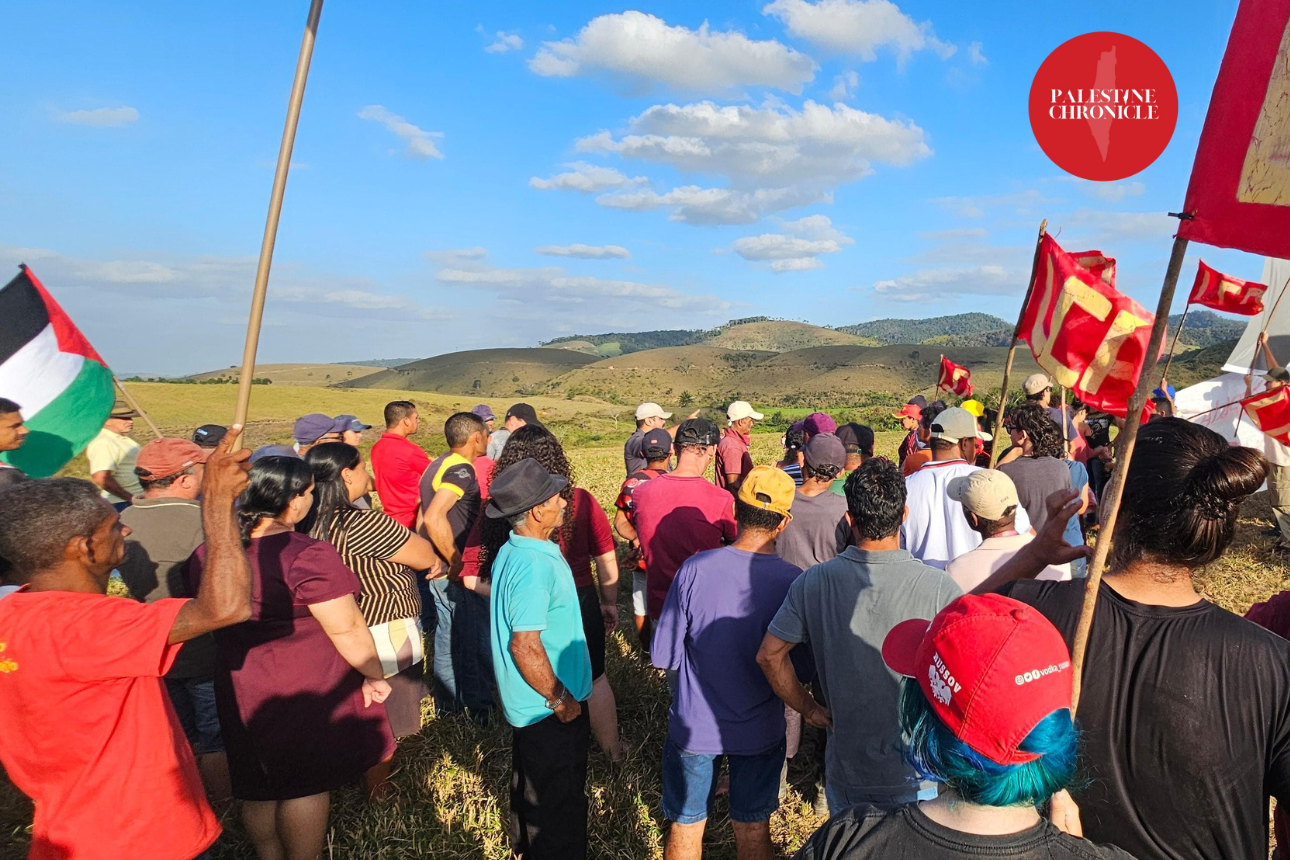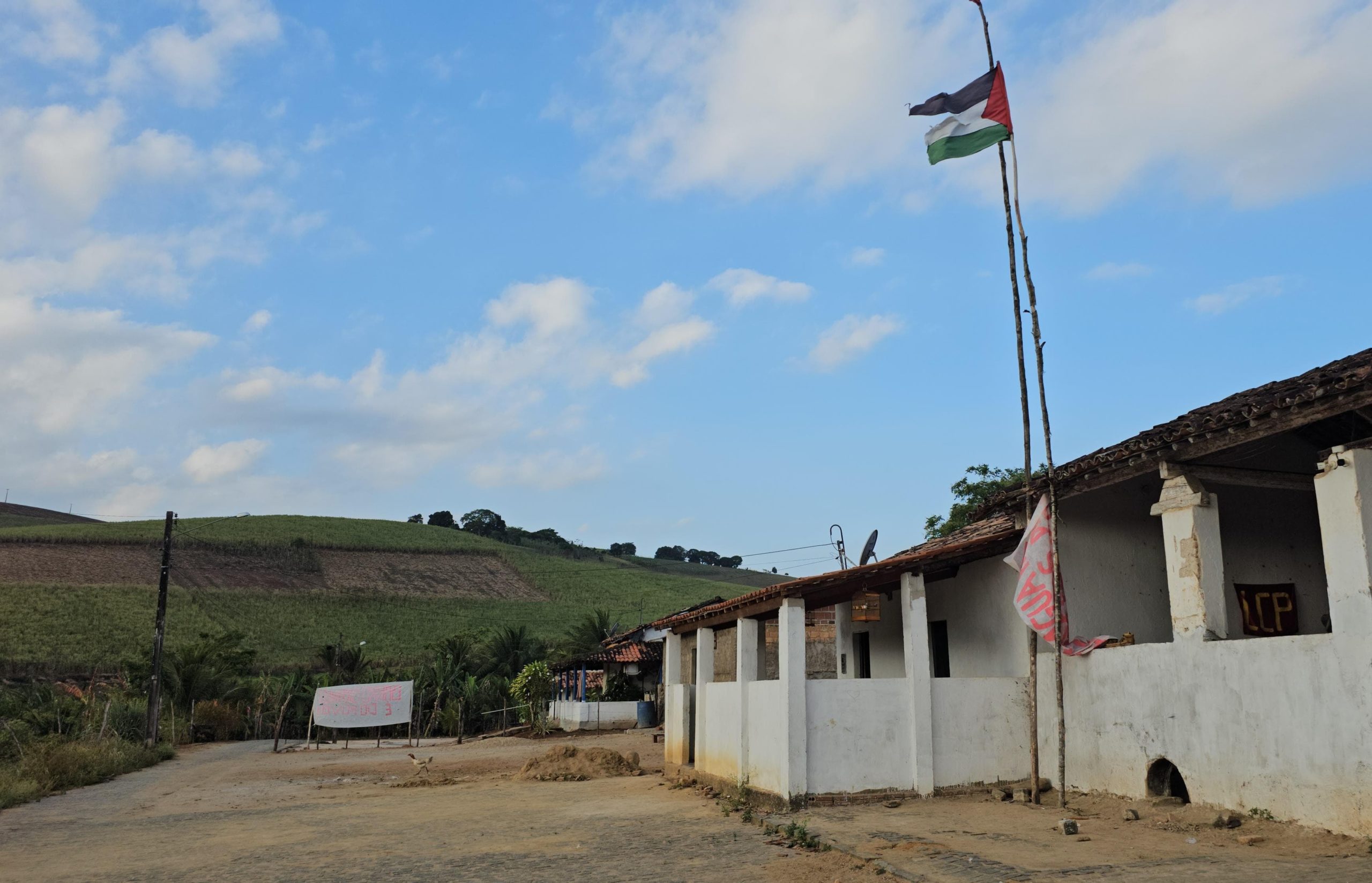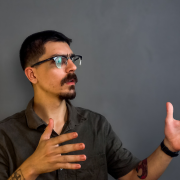
“The Palestinian people and the Brazilian people will secure their complete liberation, and even if the struggle takes a long time to fulfill, our cause will inevitably triumph!”
It was at dawn on September 28 when peasants from the Barro Branco community, in Pernambuco, northeastern Brazil, left home to sell their wares at the city’s market.
As they made their way out of the commune, built on the site of a bankrupt mill where the peasant families had worked since the 20th century, they passed through the headquarters of the mill with its two flags raised high on its front: a red flag of the League of Poor Peasants and, beside it, but higher, a Palestinian flag.
The Saturday was sunny, a sign that the city would be crowded with potential customers.
Hoping to make extra money at the end of the month, the peasants could not imagine that on that same day, a bevy of fifty armed men from the ‘Zero Invasion’ group would invade their settlement.
The invaders arrived in trucks and bulldozers, equipped with firearms and accompanied by rottweilers.
Peasants from Barro Branco in Brazil, led by the League of Poor Peasants (LCP), retook their land and set up the Menino Jonatas Camp. Their land was confiscated and destroyed by the armed militia Invasion Zero, which serves the interests of Brazilian agribusiness and landowners. pic.twitter.com/J5luZjEv9e
— redstreamnet_ (@redstreamnet_) October 28, 2024
They fired at women and children and destroyed two agrarian sites.
Immediately, the peasants mobilized themselves and called their neighbors who were selling products at the city’s fair and students supportive of the struggle.
According to the peasants, the gunmen were hired by the landowner who claims to be the owner of the mill.
‘Zero Invasion’
Zero Invasion (Invasão Zero, in Portuguese) refers to a group that attacks peasants and indigenous peoples in Brazil.
As help arrived at the settlement, the peasants organized a group to defend their land.
Video footage reveals how they blocked the road used by the invaders, setting up barricades, and hurling Molotov cocktails, stones and other artifacts at the bulldozers. After hours of confrontation, the invaders retreated.
During the battle, two peasants and a student of the Federal University of Pernambuco were injured by live ammunition, and the leader of the gunmen and one of his henchmen were hospitalized with gunshot wounds.

“I did not want to go to the hospital. That is the way the struggle goes. It is hard, but we have to face up to it”, one of the injured peasants said in an interview with the Brazilian newspaper A Nova Democracia.
Behind the victorious, in the middle of the settlement, the flags were still hoisted, fluttering.
League of Poor Peasants
The movement that organized the resistance was the League of Poor Peasants in Brazil.
A few days after the confrontation, the League celebrated the victory in a powerful statement, entitled “Peasant self-defense confronts and defeats attack by paramilitary ‘Zero Invasion’ hordes”.
One particular line in the statement stands out: “The historic saga of the democratic path in our country to defeat the bureaucratic path of the big bourgeoisie and landowners, lackeys of imperialism, today merges with the heroic Palestinian National Resistance, which on October 7th of 2024 marks the one-year anniversary of its audacious counter-offensive that shines before the whole world and calls on all the oppressed to rise up against lapsed imperialism”.
The solidarity with the Palestinian cause continues: “The indomitable Palestinian people have been fighting for 76 years against the Zionist occupation of their ancient lands”.
The organization cites other historic revolutionary struggles, evoking the victory of the Palestinian and Brazilian struggle for land.
“Exactly 75 years ago, the Chinese people, in more than 27 years of protracted people’s war, defeated three great enemies that weighed on the Chinese people and nation: imperialism, bureaucratic capitalism, and feudal and semi-feudal landlordism.
“In the same way, the Palestinian people and the Brazilian people will secure their complete liberation, and even if the struggle takes a long time to fulfill, our cause will inevitably triumph!”.

‘Agrarian Revolution’
In an interview with the Palestine Chronicle, a member of the Committee to Support the Peasants of Barro Branco explained that “the decision to hoist the Palestinian flag was taken during a popular assembly.”
“We teach every peasant kid what that flag represents so that they are raised knowing about the Palestinian struggle and its connections with our struggle here in Brazil,” the interviewee said.
“The peasants fight with the same energy as the mujahideen in Palestine”, he continued.
“We understand that our fight is against the same enemy, the US imperialism. But while the people can spread our struggle throughout the world, our enemy can not fight all these wars at the same time,” he added.
“So the most powerful act of solidarity with the Palestinian people is to advance with the Agrarian Revolution in our country, because it has a direct impact on the interests of imperialism in our country,” the activist emphasized.
New Settlement, New Flag
One month after the attack, the peasants took one more step in their struggle and took a piece of land that was destroyed by the invaders.
They named it after a child, Jonatas, the son of a peasant leader, who was assassinated in 2022 by gunmen.
The record shows that in the same way the Brazilian peasants identify themselves with the Palestinian people, the gunmen hired by big landowners have the same target as the Israeli soldiers: children, women and students.
In the march towards the retrieved land, Palestine shone again.
Amid the red flags of the League of Poor Peasants, a Palestinian flag was raised and then stuck in the middle of the new peasant settlement. The flag is still up there, tied by hand to a large pole made out of bamboo.
The Battle of Barro Branco made the peasants’ struggle a central focus of agrarian conflicts in Brazil. A petition by the peasants gathered almost 300 signatures. Alongside it, under the spotlight, is solidarity with the Palestinian cause.
(The Palestine Chronicle)

– Enrico Di Gregorio is a Brazilian journalist. He currently writes for A Nova Democracia and contributed this article to The Palestine Chronicle.